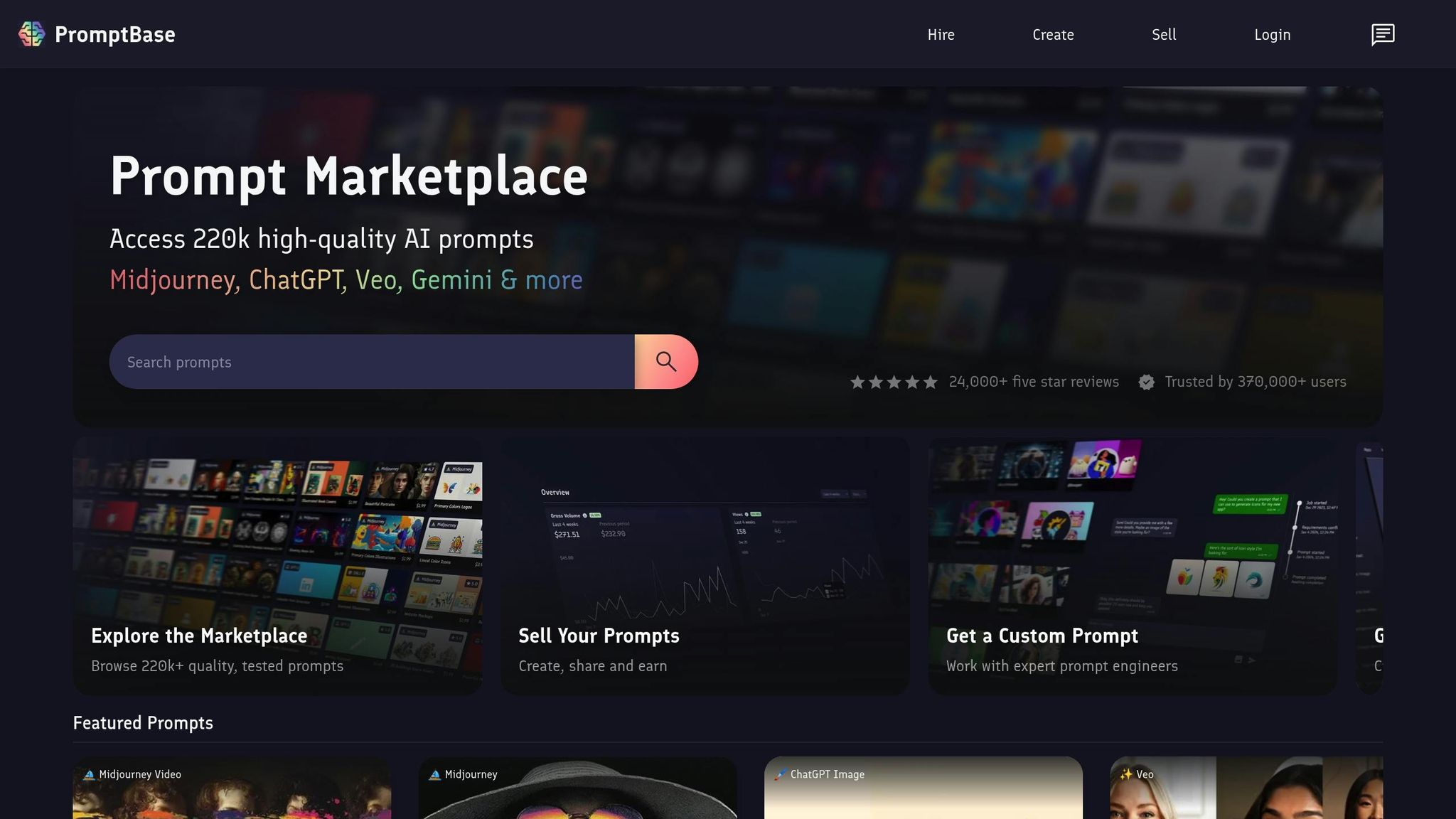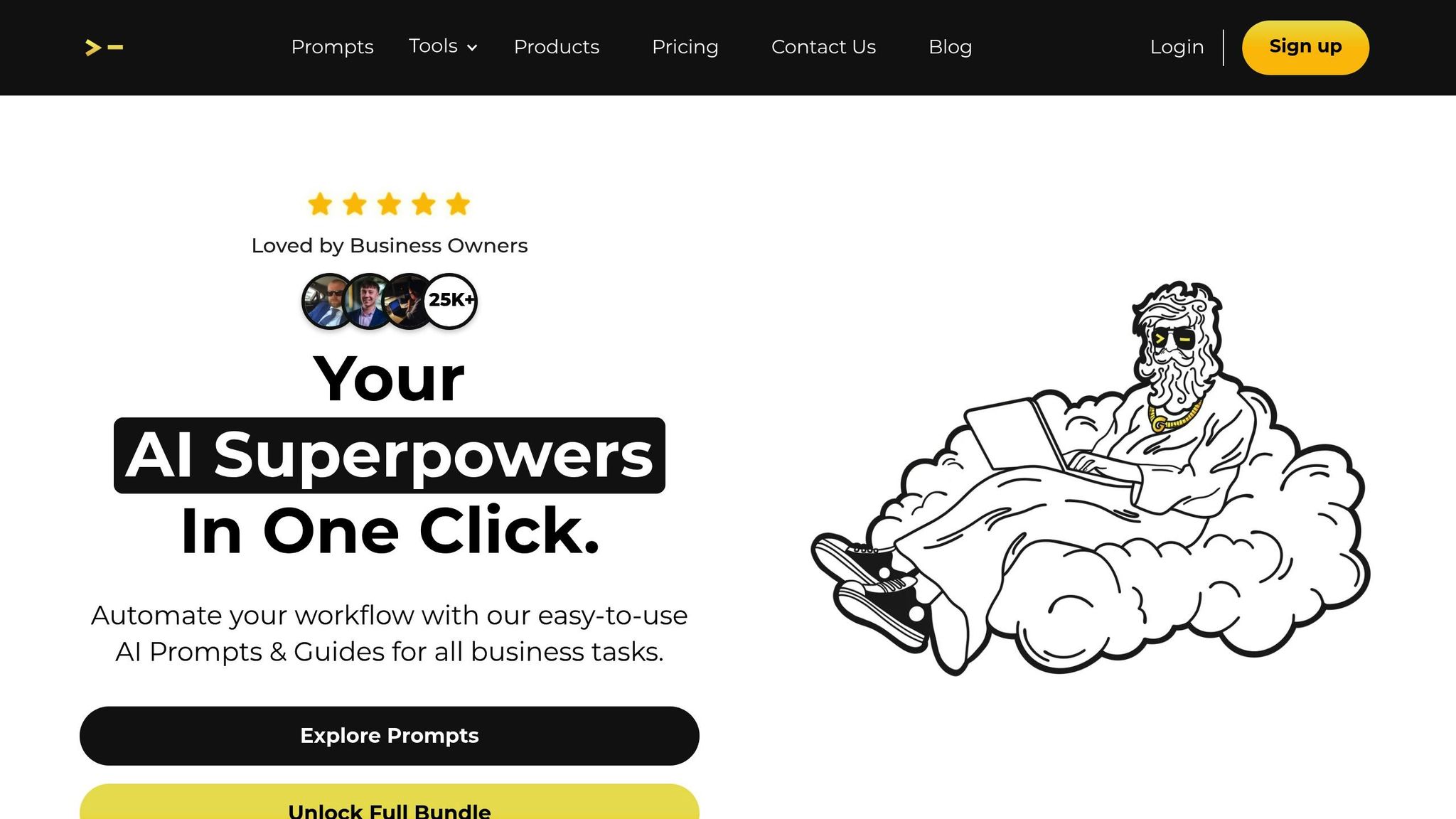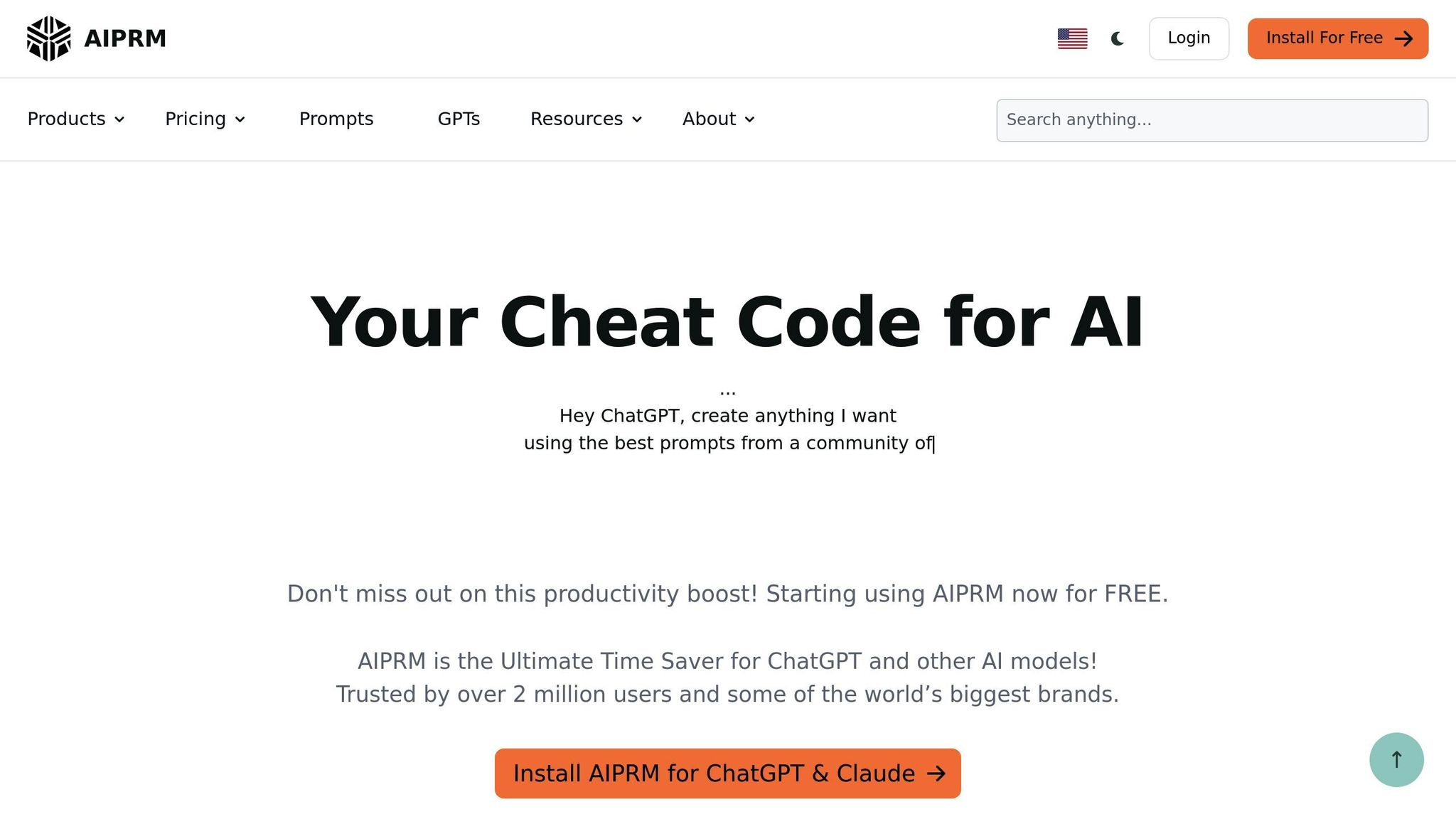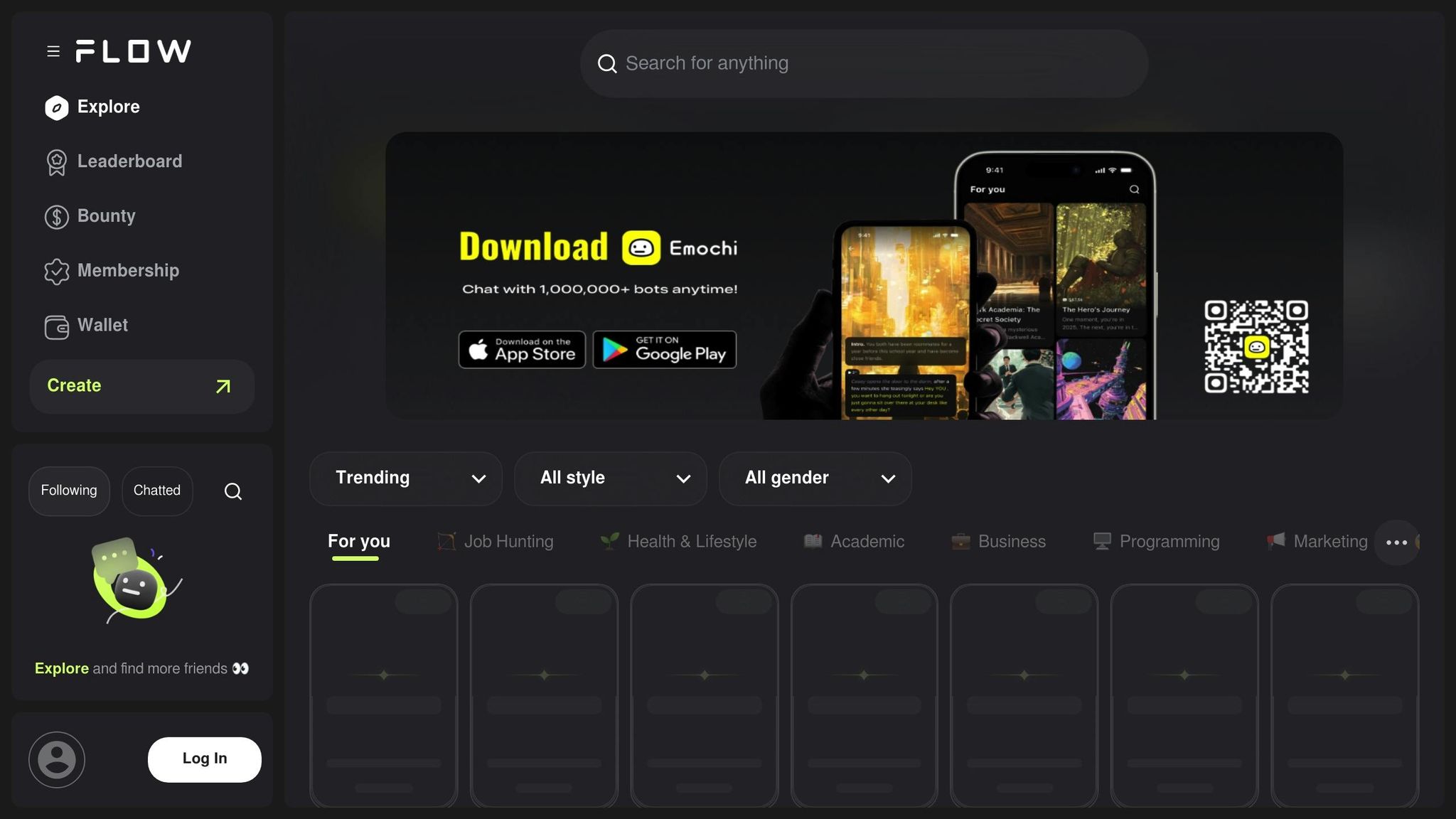
Choosing the right AI prompt marketplace can save your business time and money. Here's a quick guide to four platforms that cater to business users looking for high-quality, reliable prompts for tools like ChatGPT, Midjourney, and Claude:
| Platform | Key Features | Pricing Model | Best For |
|---|---|---|---|
| God of Prompt | Curated prompts, lifetime updates | One-time payment ($37–$150) | Teams needing a complete toolkit |
| PromptBase | Pay-per-prompt, wide variety | $1.99–$9.99 per prompt | Occasional or specific needs |
| AIPRM | SEO/marketing focus, team tools | Subscription ($9+/month) | Marketing and SEO workflows |
| FlowGPT | Multi-model testing, community-driven | Free + paid tiers ($50+) | Experimentation and flexibility |
Each platform addresses different needs. For predictable costs, God of Prompt is a strong choice. PromptBase works for one-off needs, while AIPRM is great for SEO-heavy tasks. FlowGPT shines for testing across AI models. Choose based on your team's goals and budget.


God of Prompt serves as a robust resource hub, offering far more than just a collection of prompts. With over 30,000 AI prompts alongside educational materials and business toolkits, this platform supports a wide range of AI tools, including ChatGPT, Claude, Midjourney, Gemini AI, and newer entrants like Grok, Veo, and Sora. Its versatility makes it suitable for businesses operating in multi-AI environments.
The platform's extensive library is thoughtfully organized into categorized bundles tailored to specific needs like marketing, SEO, financial analysis, and e-commerce. Each prompt comes with contextual guidance, helping users understand not just how to use the prompts but also when to apply them for optimal results.
A standout feature is the inclusion of "Mega-Prompts" - detailed frameworks designed to tackle complex, multi-step business tasks. These go beyond simple, one-line instructions, offering structured prompts that deliver consistent, professional-grade outputs. This makes them particularly useful for businesses aiming to streamline intricate workflows.
God of Prompt is designed with businesses in mind. It offers custom GPT toolkits and prompt engineering guides, empowering teams to create specialized prompts tailored to their unique needs. This educational component enables companies to build in-house AI expertise rather than relying solely on pre-made solutions.
Additionally, the platform provides an AI tools directory, helping businesses explore and evaluate new AI technologies. Paired with detailed how-to guides, it equips teams to implement AI solutions across various scenarios, from automating customer service to scaling marketing efforts. These resources position God of Prompt as more than just a prompt library - it's a comprehensive toolkit for businesses looking to integrate AI effectively.
God of Prompt's tiered pricing structure accommodates a variety of budgets and business needs. The free tier offers access to over 1,000 ChatGPT prompts and 100+ Midjourney prompts, allowing users to explore the platform before committing to a paid plan.
For more specialized needs, there are targeted bundles:
The Complete AI Bundle ($150) delivers the best value, offering all 30,000+ prompts, unlimited custom prompt generation, and access to every product. All paid plans include lifetime updates and come with a 7-day money-back guarantee, ensuring flexibility and peace of mind.
Beyond its features and pricing, God of Prompt emphasizes usability. It leverages Notion’s familiar interface, making it easy for teams to integrate prompts into their existing workflows without needing to adopt new software. This setup streamlines collaboration, allowing team members to share, modify, and organize prompts within a unified workspace.
The Notion-based delivery also enables businesses to create custom prompt libraries tailored to their specific processes, ensuring consistency across projects and departments. Plus, with lifetime updates, businesses can avoid recurring subscription fees while still benefiting from the latest advancements in AI prompts. This approach is particularly appealing for smaller businesses and startups aiming to balance cost management with technological growth.
PromptBase is a marketplace where creators can sell AI prompts, offering a variety of options that businesses must carefully evaluate for quality and relevance.
The quality of prompts on PromptBase can vary significantly. Some creators provide highly refined and tested prompts, while others offer more basic options. To make informed choices, business users should rely on ratings and reviews. Prompts are categorized by their compatibility with different AI tools - such as ChatGPT, DALL-E, Midjourney, and Stable Diffusion. However, many prompts function as standalone solutions rather than being part of a broader, integrated workflow.
The platform includes search and filtering features to help users narrow down options by category and price. That said, the sheer number of available prompts can make it challenging to pinpoint the most suitable ones for specific business needs, often requiring extra time and effort.
For businesses, maintaining consistent quality and receiving tailored support are key priorities. While PromptBase offers a flexible marketplace model, it has limitations for business-focused use. The platform does not provide dedicated business accounts, team collaboration tools, or enterprise-level support. Some sellers do offer customization options, allowing businesses to communicate directly with creators to request modifications or custom solutions. However, this approach can lead to inconsistent service quality, as experiences vary depending on the individual creator. Licensing terms also differ by seller, so businesses need to carefully review each purchase to ensure compliance with commercial usage rights.
PromptBase operates on a pay-per-prompt pricing model, and there are no bulk discount options. This can make it more expensive for businesses that require multiple specialized prompts.
Prompts are available for instant download as text or PDF files, making them easy to acquire for individual users. However, businesses may need to create their own systems to manage and organize these prompts effectively. The platform’s clean, web-based interface is user-friendly for browsing and purchasing but is not designed with team collaboration in mind. Businesses might need additional tools to share and track their prompt collections efficiently.
Next, we’ll take a closer look at AIPRM to compare its business-oriented features and functionality.

Much like "God of Prompt", AIPRM is designed to serve businesses with well-organized, efficient solutions. AIPRM, short for AI Prompt Management, functions as a browser extension that integrates directly with ChatGPT. Its goal? To provide curated prompts that enhance productivity and simplify marketing tasks.
AIPRM specializes in creating prompts tailored for business needs like SEO, marketing, and customer support. Each prompt comes with clear descriptions and step-by-step instructions, ensuring users know exactly what to expect before putting them to use. Prompts are sorted into categories such as marketing, sales, operations, and content creation. By incorporating user feedback, AIPRM helps teams identify the most effective options, making it easier for those already familiar with ChatGPT to hit the ground running.
Designed with businesses in mind, AIPRM offers tools that enhance team collaboration and efficiency. Administrators can control team access to ensure consistent messaging across the board. Features like prompt versioning and automatic updates keep workflows smooth and up-to-date. For businesses with specific needs, AIPRM also provides custom solutions, including personalized prompt development and private prompt libraries.
AIPRM uses a freemium pricing structure, offering something for everyone. The free tier gives access to a curated selection of prompts, while premium plans unlock more advanced features, such as enhanced team management tools and priority customer support. For larger organizations, custom pricing options are available, making it a flexible choice for both individuals and businesses.
As a Chrome extension, AIPRM integrates seamlessly into the ChatGPT interface, allowing users to browse, search, and apply prompts without disrupting their workflow. Its intuitive interface includes search tools, category filters, and options to organize prompts by project or department. However, because it operates as a browser extension, AIPRM is limited to web-based ChatGPT use, which means it doesn't support API integrations or other platforms. Still, this design emphasizes smooth team workflows within its intended environment.
Next up, we'll dive into FlowGPT's collaborative approach to prompt sharing.

FlowGPT serves as a community-driven marketplace, functioning like an AI app store where users can create and share "Flows." These Flows bundle prompts into reusable tools, making the platform stand out in a crowded space that values both creativity and precision. This structure appeals particularly to businesses eager to explore AI solutions without a steep learning curve.
"FlowGPT is a compelling community hub for discovering prompts and packaging them into shareable, lightweight AI apps." - Skywork AI
FlowGPT's reliance on its community leads to a wide variety of generative AI apps. While this ensures a rich selection of prompts, the quality can vary significantly. To help users navigate this, the platform uses ratings, tags, and usage data to surface the most effective prompts. However, it lacks a formal, centralized curation system.
For businesses, this creates both opportunities and potential hurdles. On one hand, you can uncover creative prompts that may not exist on more structured platforms. On the other, it’s important to thoroughly test and validate these prompts before deploying them in critical workflows. The platform’s flexibility makes it particularly useful for businesses experimenting with marketing strategies, productivity tools, or automation workflows.
One standout feature is its multi-model chat capabilities, which allow users to test the same prompt across different AI models, including ChatGPT, Claude, and Llama. This makes it easier for businesses to compare outputs and choose the best model for their specific needs.
FlowGPT offers tools designed to make workflow development seamless. Features like Quick Mode and Expert Mode allow users to package prompts into shareable applications, promoting collaboration and efficiency across teams. These tools enable businesses to prototype and refine AI-driven solutions quickly.
Another helpful feature is its document processing capability, which lets users upload and query documents directly. This is particularly useful for extracting insights from large text volumes or automating document analysis tasks.
FlowGPT’s marketplace dynamics also support rapid experimentation. Creators and marketers can quickly test and iterate on prompts for various applications, sharing successful workflows with their teams to enhance productivity and innovation.
FlowGPT uses a "pay as you grow" pricing model, eliminating monthly subscription fees. Instead, users pay based on the number of AI words they consume, making it a flexible option for businesses with fluctuating needs.
The platform offers three main tiers:
Additionally, token-based options are available, such as 500 Tokens for $49.99 and 1,000 Tokens for $89.99.
FlowGPT is web-based, which means it’s accessible across devices without requiring browser extensions or complex setups. Its user-friendly interface focuses on discovery and sharing, with robust search tools and category filters to help users find relevant prompts effortlessly.
The platform’s flexibility allows businesses to experiment with multiple AI models within a single interface, removing the need to juggle between different tools. However, the open marketplace structure means users must spend time evaluating prompts to ensure they meet specific business requirements.
In September 2025, TechCrunch recognized FlowGPT as a leading platform for discovering and sharing AI prompts. This acknowledgment highlights its growing role in the evolving world of generative AI applications. Next, we’ll dive into how these features stack up against the platform’s overall strengths and challenges.
When it comes to choosing the right prompt marketplace, decision-makers need to weigh the pros and cons carefully. Each platform has its own unique features, pricing models, and target audiences, making it essential to align your choice with your business needs, budget, and workflow. To make this easier, the table below breaks down the key differences for quick comparison.
Let’s start with God of Prompt, which stands out as a one-time investment solution. It offers curated prompt bundles tailored for business use, all delivered via a straightforward Notion interface. This eliminates the hassle of recurring subscriptions, making it a practical choice for teams looking for a streamlined, predictable option.
On the other hand, PromptBase focuses on quality assurance through formal review processes. While this ensures reliable prompts, its per-prompt pricing model can become expensive for businesses with high-volume needs.
For companies focused on SEO and marketing, AIPRM provides strong value with its direct integration into ChatGPT. It offers both free options and premium subscriptions starting at $9 per month, catering to users who prioritize specialized tools for content optimization.
Meanwhile, FlowGPT takes a community-driven approach, offering free access to over 10 million users. Its multi-model testing capabilities make it a creative hub for prompt experimentation, though the variable quality of prompts may require additional internal validation before implementation.
| Platform | Prompt Quality | Business Features | Pricing Model | Ease of Use |
|---|---|---|---|---|
| God of Prompt | High (curated bundles) | Comprehensive business focus | One-time payment ($37–$150) | User-friendly Notion interface |
| PromptBase | High (tested & reviewed) | Extensive library | Per-prompt ($1.99–$9.99) | User-friendly marketplace |
| AIPRM | Curated for business | SEO/marketing focus | Subscription (starting at $9/month) | Chrome extension integration |
| FlowGPT | Variable (community-driven) | Multi-model testing | Free with paid tiers | Simple web interface |
The pricing models vary significantly between platforms, which can impact long-term costs based on your usage. For example, FlowGPT’s free tier is ideal for businesses experimenting with AI integration, while God of Prompt’s one-time payment structure eliminates ongoing expenses. In contrast, PromptBase’s per-prompt pricing is better suited for occasional users but can quickly add up for organizations building extensive prompt libraries.
Integration features also set these platforms apart. AIPRM’s browser extension allows seamless integration with ChatGPT, which is especially useful for marketing and SEO tasks. FlowGPT’s support for multiple AI models provides flexibility, making it a good fit for teams exploring different systems. Meanwhile, God of Prompt’s Notion-based delivery works well for businesses already using collaborative tools, enhancing organization and accessibility.
FlowGPT also encourages community collaboration, but its user-driven model requires more evaluation compared to PromptBase’s curated approach, which emphasizes reliability and consistency.
Choosing the right prompt marketplace boils down to understanding your business needs and priorities, as each platform offers something different.
God of Prompt stands out as a budget-friendly option, boasting a 4.8 rating from 743 reviews and a one-time purchase model. This means no recurring subscription fees - just lifetime access with ongoing updates. Alex Grant, Marketing Specialist at CMF Marketing, shared:
"God of Prompt has transformed our workflow, making it easier to generate high-quality content quickly."
For those prioritizing quality assurance, PromptBase is a solid contender, while AIPRM shines with its focus on SEO-driven prompt management.
The benefits of these platforms are more than just theoretical. For instance, businesses using God of Prompt have reported a 50% increase in marketing output and a 30% reduction in content creation time. These results highlight how the right platform can have a direct and measurable impact on productivity.
With its mix of robust resources, predictable costs, and proven outcomes, God of Prompt is an appealing choice for businesses seeking dependable, long-term AI tools to support their growth.
When choosing an AI prompt marketplace, businesses should pay close attention to the quality and range of prompts available. Opt for platforms that offer carefully curated and tested prompts designed to meet diverse needs, whether it's boosting productivity, enhancing marketing efforts, or streamlining automation processes.
The user experience is another key factor. A platform with an easy-to-use interface and smooth navigation makes it simple to locate and apply the right prompts. Also, check for community involvement and support. An active user community paired with responsive customer service can be incredibly helpful for troubleshooting and gaining insights.
Focusing on these elements can help businesses select a marketplace that aligns with their needs and adds real value to their operations.
The pricing model for God of Prompt is built to deliver lasting value, offering options that suit a range of business needs. By providing expertly crafted AI prompts, it helps companies streamline their processes, save time, and cut down on unnecessary expenses. This means businesses can focus more on their core operations while boosting productivity.
Choosing a platform like God of Prompt can also lead to a stronger return on investment (ROI). It eliminates the hassle of creating prompts in-house or wasting resources on trial-and-error approaches. Plus, the pricing is clear and straightforward, making it easy for businesses to plan their budgets without any surprises.
God of Prompt specializes in providing businesses with customized solutions to fully leverage AI tools like ChatGPT and Midjourney. By delivering carefully crafted, high-quality prompts, it helps businesses simplify processes such as automating customer service, generating engaging marketing content, and boosting overall efficiency.
For tackling more advanced needs, God of Prompt offers powerful mega-prompts. These are designed to handle complex tasks like developing strategic business plans, conducting competitive analyses, and performing detailed market research. By saving time, enhancing precision, and offering actionable insights, these tools position God of Prompt as a go-to resource for businesses aiming to make the most of AI technology.





